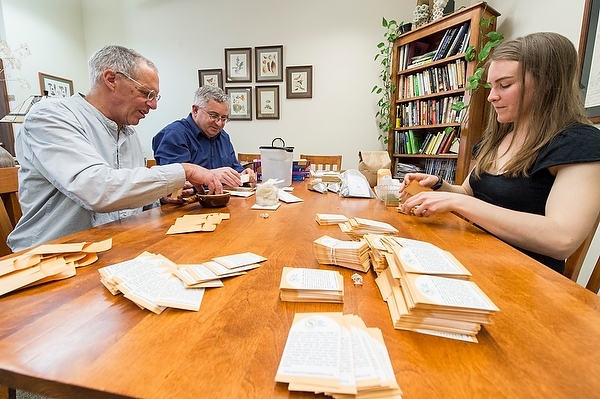Madison, Wisconsin, USA
April 15, 2014

Jack Kloppenburg (left), professor in the Department of Community and Environmental Sociology, Irwin Goldman (center), chair of the Department of Horticulture, and Claire Luby (right), graduate student in the UW’s Plant Breeding and Plant Genetics program, fill envelopes with non-patented seeds in the Horticulture office in Moore Hall. Photo: Bryce Richter
This week, scientists, farmers and sustainable food systems advocates will gather on the University of Wisconsin-Madison campus to celebrate an unusual group of honored guests: 29 new varieties of broccoli, celery, kale, quinoa and other vegetables and grains that are being publicly released using a novel form of ownership agreement known as the Open Source Seed Pledge.
The pledge, which was developed through a UW-Madison-led effort known as the Open Source Seed Initiative, is designed to keep the new seeds free for all people to grow, breed and share for perpetuity, with the goal of protecting the plants from patents and other restrictions down the line.
"These vegetables are part of our common cultural heritage, and our goal is to make sure these seeds remain in the public domain for people to use in the future," says UW-Madison horticulture professor and plant breeder Irwin Goldman, who helped write the pledge.
Goldman will release two carrot varieties he developed-named Sovereign and Oranje in the spirit of the event-at a public ceremony Thursday's public ceremony, which is set for 11 a.m. on the front lawn of the UW-Madison's Microbial Sciences Building, 1550 Linden Drive.
The Open Source Seed Initiative (OSSI) was established in 2011 by public plant breeders, farmers, non-governmental organization staff and sustainable food systems advocates from around the nation concerned about the decreasing availability of plant germplasm-seeds-for public plant breeders and farmer-breeders to work with.
Many of the seeds for our nation's big crop plants-field corn and soybeans-are already restricted through patents, licenses and other forms of intellectual property protection. Increasingly, this is happening to vegetable, fruit and small grain seeds. Members of OSSI worry that this trend could lead to a time when there's no longer any valuable plant germplasm available for public use.
"Already, many public breeders don't have the freedom to operate. They can't do what they want to do as often as they would like," says Jack Kloppenburg, UW-Madison professor of community and environmental sociology and author of "First the Seed," who has provided much of the guiding vision for the OSSI group.
Early on, inspired by the open source software community, which freely shares and collaborates to improve their products, OSSI members starting exploring how to develop open source licenses for seeds-but came upon numerous roadblocks along the way.
This spring, eager to get things moving forward again, Goldman and Kloppenburg convinced many in the group to embrace the simplest option they had discussed: the Open Source Seed Pledge.
Unlike the comprehensive open source licenses the OSSI group originally tried to develop, the pledge is very concise. It's so short it will be printed on all OSSI seed packets.
"It's almost like a haiku," says Goldman. "It basically says these seeds are free to use in any way you want. They can't be legally protected. Enjoy them."
By opening the packet, a person signals their commitment to keep those seeds-and any future plant derivatives bred using them-in the public domain.
"It creates a parallel system, a new space where breeders and farmers can share seeds," says Kloppenburg. "And, because it applies to derivatives, it makes for an expanding pool of germplasm that any plant breeder can freely use."
Even with the new pledge available, Goldman, who breeds beets, carrots and onions, still plans to license many of his new varieties the traditional way through the Wisconsin Alumni Research Foundation (WARF), the patenting and licensing arm of the UW-Madison, which has been supportive of his interest in open source seeds. It depends on the situation, he notes.
If Goldman develops a new variety that he'd like to see large seed companies incorporate into their breeding programs-for instance, a new carrot with improved disease resistance-he'll most likely work with WARF to release the seeds using a traditional license.
But Goldman is thrilled that he now has an alternative option, for when he wants to share new varieties with fellow public plant breeders-or small seed companies.
"There are economic opportunities here," he notes. "You can sell these open source seeds just like you'd sell any other seeds. The difference is that the recipients can actually do stuff with them, which is kind of fun."
Because the Open Source Seed Pledge has not been tested, it's unclear what its legacy may be. For now, OSSI members are enjoying their recent accomplishments and hoping for the best.
"Who knows what will happen, but even if the pledge does nothing more than help raise awareness about what's going on with seeds, that's progress," says Goldman.
And the group hopes for much more.
Some would like to finish the job of developing a more comprehensive open source license for seeds. Others want to bring international partners on board.
"This is the birth of a movement," says Kloppenburg. "Open source means sharing, and shared seed can be the foundation of a more sustainable and more just food system."